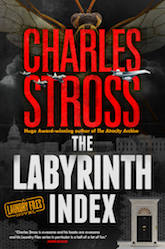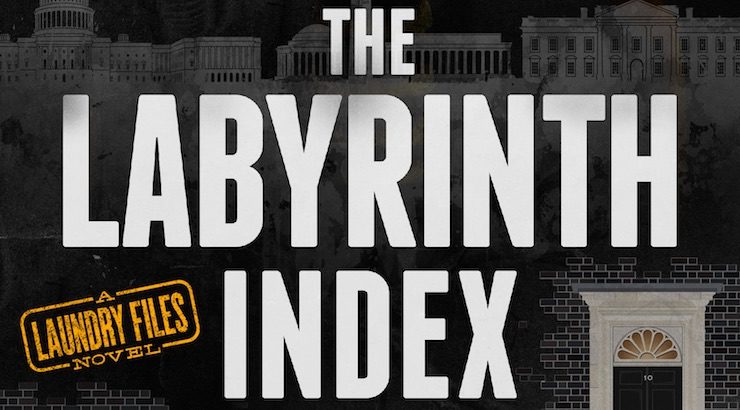Mhari Murphy has been stepping delicately through often-capricious, often-brutal matters of state under the New Management until she’s tasked with the creation of an organization resembling the unfettered Laundry of decades past. The United States has, apparently, wholesale forgotten its President; furthermore, their diplomatic channels have gone eerily, threateningly dark. Not for the first time, something rotten is afoot across the pond. Mhari’s clean identity record, no past fieldwork, makes her an ideal candidate to tackle the problem—though she’s not so sure of that.
The ninth book in Stross’s Laundry Files, The Labyrinth Index, follows Mhari and a motley band of agents to America with the intention of undermining a potential coup of the entire US government by the Black Chamber—also known as the Nazgûl—under the aegis of their own ancient horror. It’s grim business from start to finish, as state- and spycraft so often are in Stross’s novels.
Mild spoilers.
Structurally, The Labyrinth Index is reminiscent of The Annihilation Score (previously reviewed here): our protagonist is placed as head of an agency that does not exist and tasked with creating, staffing, and managing it from the field. In both cases, the forces behind the promotion are at absolute best viciously neutral. Mo was dealing with internecine governmental back-trapping while Mhari has the New Management to appease, a more dangerous proposition. The thread running through the recent novels in the series is present for Mhari as well—namely, the imposter syndrome all of the Laundry survivors seem to feel at finding themselves suddenly inhuman, immensely powerful, and at key positions on an eldritch, unthinkable chessboard.
The plot is, as much as possible, straightforward: the Nazgûl have made their play to usurp the power of the US to dread Cthulhu’s ends (which involve disassembling our solar system for parts). Mhari and her team, plus survivors and continuity agents of America’s own disparate occult agencies, must rescue the forgotten President and remind his nation he exists… so the occult energies invested in the office cannot be used to worse ends. It proceeds with crisp speed and action, as one expects of this series, with a few twists created primarily by virtue of narratorial unreliability and geas manipulation. Some novels in the series kick over the table; the previous installment was one of those. This one, in turn, starts rearranging the scattered pieces—the story is significant and gripping, but it’s a building block.
Mhari as narrator, though, provides a fresh angle on the bleak outlook of the series. She’s a pragmatist and she’s dedicated to success; she’s also concerned with her emotional life and relationships, including the mistakes she’s made—some of which ultimately led to her transition to a PHANG working once more with the British government against the forces of the apocalypse. Seeing her particular foibles from the inside is intriguing, especially in contrast with the earliest memories we have of her. I appreciate deeply how Stross develops the women of the Laundry series over time and outside of Bob’s perspective to give us a whole, nuanced portrait of them each as individual humans (or vampires, in this case).
In this novel, she’s pushed beyond her capabilities quite purposefully by the Mandate—her imposter syndrome is actually a weapon against oracles, as it makes her actions hard to predict. Ultimately she excels, as he expected. This is, of course, a book chock full of moral grey areas and horrible decisions. Mhari navigates them as well as she’s able without losing herself or her sense of deep conflict, with the end goal of both completing her objectives and working to, perhaps, change the playing field again to better serve humanity’s interests.
One of the things I enjoyed in The Annihilation Score remains in the background here as well: when Mhari thinks of confidantes and colleagues at the start of the novel, she thinks of other women—Mo, Ramona, and Persephone. It’s pleasant to see that web of powerful women supporting each other continuing on, though it plays less of a role as she’s stranded overseas on-mission. Jonquil the female elf-mage is also an intriguing character, as if she were human she would be diagnosed along the autism spectrum. Mhari’s rage at her treatment in the refugee camp and the double-cross she enacts to free her to join the team were a relief, as was Pete’s careful understanding of her needs. Stross is conscientious in his representation of her difficulties and strengths, as contrasted with other characters in the novel who are noted to be on the spectrum themselves.
Furthermore, on the thread of the emotional arcs: one of the subplots in The Labyrinth Index is a romance between Mhari and Jim. Their relationship progresses from her referring to him primarily as “her Fuckboy” at the start to admitting she’s been holding him at arm’s length as he has her, then finally to the decision to throw caution to the wind and be together. After all, it’s the end of the world in two wrong steps. One response is to shut down, but the other is to live and love more furiously, to embrace one of the guiding lights of what keeps them human. Given the relationship strain we’ve recently been through in the series with Mo and Bob, there’s relief in a fresh romance blossoming through the horror of it all. Life’s hard, but at least we live it together. That seems to be the thread of hope the reader clings to throughout these novels.
Buy the Book


The Labyrinth Index
Also of particular, more gruesome interest to me—a reader who is American but has lived in the United Kingdom—is the reversal of seeing the British view on the nightmare-fuel that is the American political and cultural system. It’s an external view that’s both dislocating and as intimate as glancing in the mirror (if that mirror were a warping portal into one of the worst possible futures). The Labyrinth Index is a scathing, accurate outsider’s perspective of the form of political organization the US prefers—distinctly inflected with post-Brexit, post-Trump realism—including spot-on assessments of operational and cultural weakspots. The politics of these novels evolve with the times and Stross captures the chaotic violence of the American system with a deft eye and incisive prose.
Which is not to say the British fare better; they just fuck up differently. The problem of the Mandate has me chewing a thumbnail, eager as I’ve been each time around for the story to continue unwinding. He’s fascinating and awful as a capricious enemy-of-our-enemies maneuvering his pawns, particularly as those pawns are people the reader has an emotional connection to. Mhari’s geas prevents her from doing more than hinting about the existence of a deep-level plot to unseat and escape the claws of the interdimensional being that has taken humanity as a pet project. I’ll be intrigued to find who is involved and what steps are part of the process for outwitting a god-like being. Given that much of the leadership of Continuity Operations is no longer remotely human, I suspect it’ll be a grisly affair.
The stakes continue to climb as the series progresses—but in a believable and harrowing fashion. Mhari is a wry narrator whose opinions of other familiar individuals in her life are an intriguing illustration of who they are to others, how they appear outside of themselves. She’s a realist and a romantic; given the grim trajectory of the end of human existence, that touch of love and hope is actually important to me as one of the points of this book. The Labyrinth Index is recommended reading as always, perhaps more of a “filling in necessary details to move the plot forward” book than some in the series but still eminently compelling.
The Labyrinth Index is available from Tor Books.
Read an excerpt here.
Lee Mandelo is a writer, critic, and editor whose primary fields of interest are speculative fiction and queer literature, especially when the two coincide. They have two books out, Beyond Binary: Genderqueer and Sexually Fluid Speculative Fiction and We Wuz Pushed: On Joanna Russ and Radical Truth-telling, and in the past have edited for publications like Strange Horizons Magazine. Other work has been featured in magazines such as Stone Telling, Clarkesworld, Apex, and Ideomancer.










